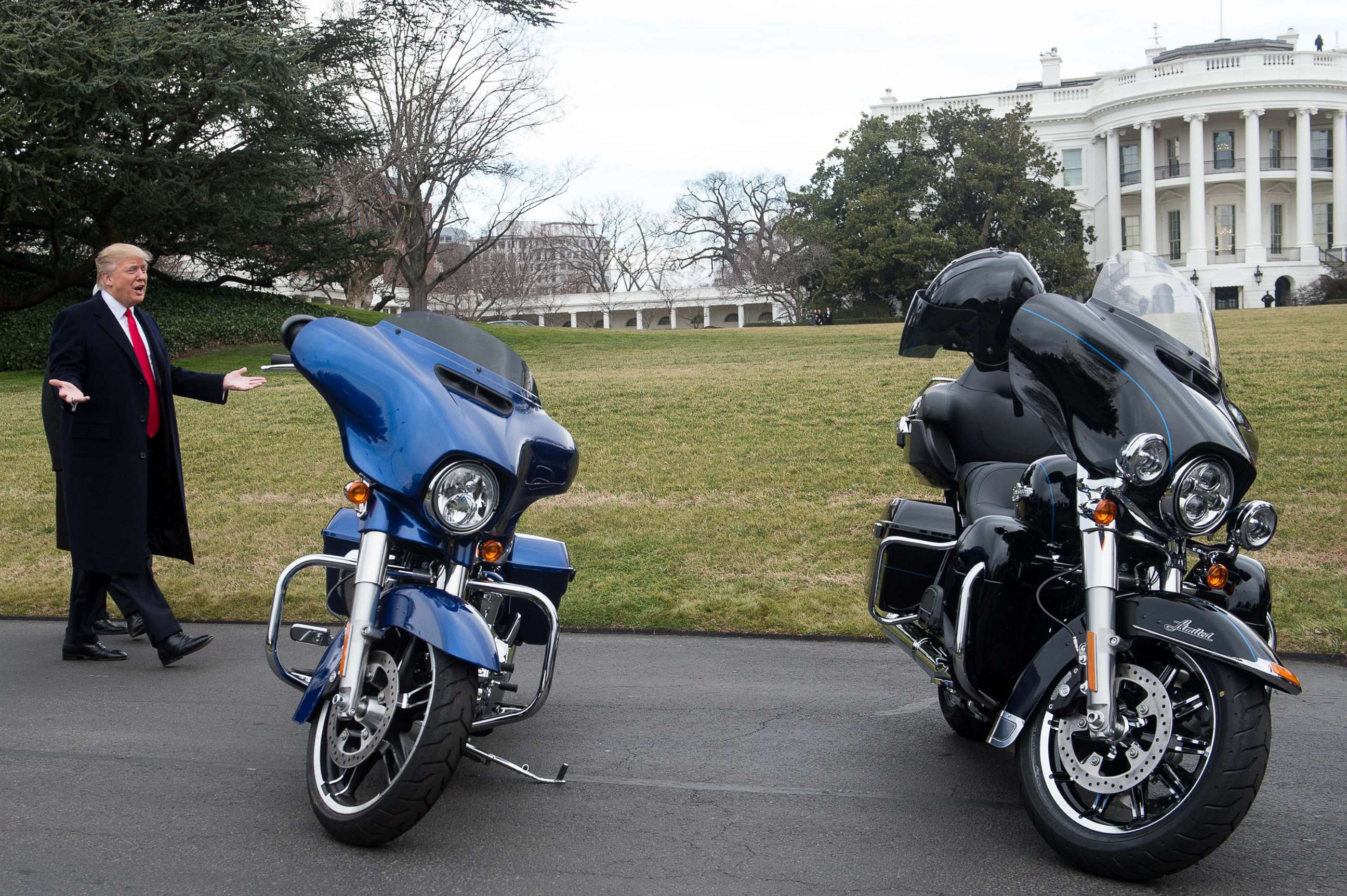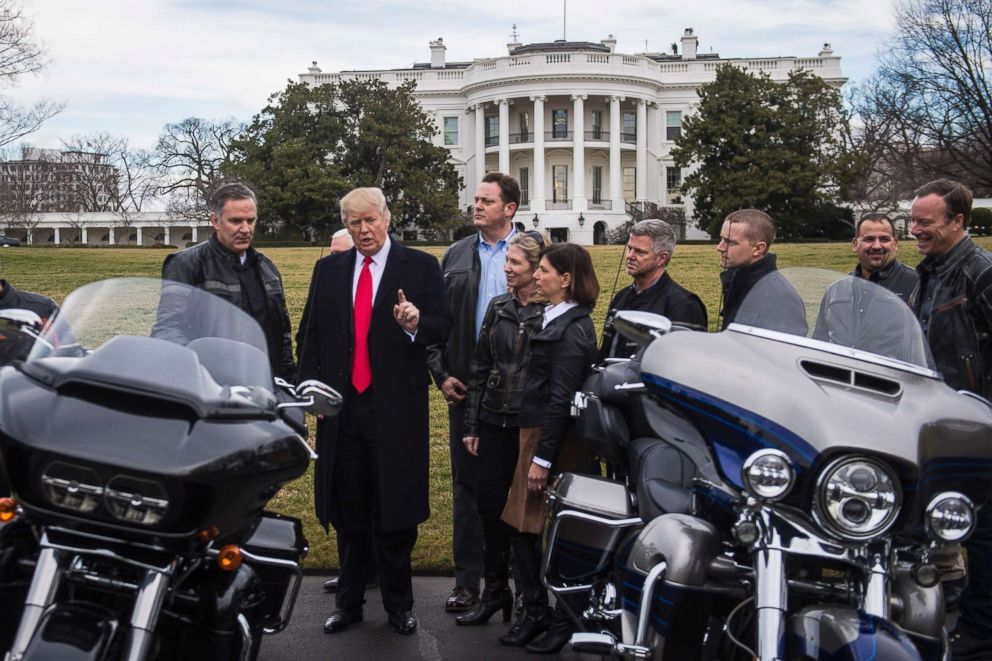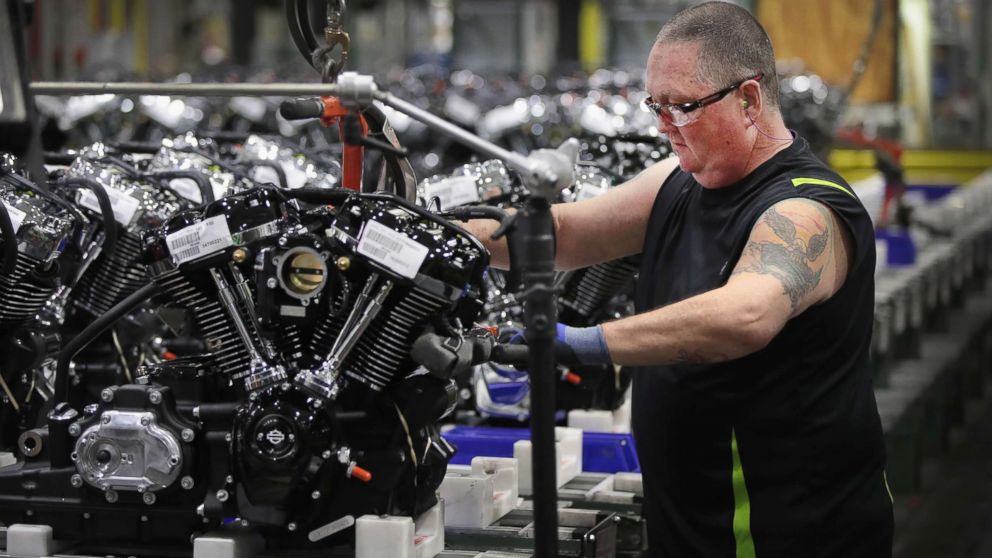Harley-Davidson, blaming retaliatory tariffs, to shift some production abroad
President Donald Trump accused Harley-Davidson Monday of waving "the white flag" after the iconic motorcycle brand, citing the financial burden of new tariffs levied against American products in the trade dispute between the president and the European Union, disclosed plans to relocate some of its production overseas.
The president, who once showcased the company's motorcycles at the White House while touting domestic manufacturing, said he was "surprised" by the move.
Harley-Davidson divulged the plans in a Securities and Exchange Commission filing Monday morning which draws a direct link between the Trump administration's implementation of steel and aluminum tariffs against the E.U. and its transfer of motorcycle production for "E.U. destinations" to "international facilities."
On Friday, the E.U. began to tax nearly $3.3 billion worth of imports from the U.S., including Harley-Davidson motorcycles, in response to the Trump administration's 25 and 10 percent tariffs on steel and aluminum, respectively, imposed in late May. Harley-Davidson claimed Monday that the E.U.'s action increased the tariffs on its motorcycles "from 6 percent to 31 percent."
"Harley-Davidson will not raise its manufacturer’s suggested retail prices or wholesale prices to its dealers to cover the costs of the retaliatory tariffs," the company stated in the SEC notice, adding, "To address the substantial cost of this tariff burden long-term, Harley-Davidson will be implementing a plan to shift production of motorcycles for EU destinations from the U.S. to its international facilities to avoid the tariff burden."
The president responded to the situation via Twitter Monday afternoon, writing that he was "surprised that Harley-Davidson, of all companies, would be the first to wave the White Flag."
"I fought hard for them and ultimately they will not pay tariffs selling into the E.U., which has hurt us badly on trade, down $151 Billion," he continued. "Taxes just a Harley excuse - be patient!"
Trump's claim that "ultimately [Harley-Davidson] will not pay tariffs," appeared to imply that he believed that the E.U. would reverse its decision.
In February 2017, Trump welcomed Harley-Davidson executives to Washington and viewed a number of the company's motorcycles on the White House South Lawn. At the time, he specifically thanked the company "for building things in America."
"I think you’re going to even expand -- I know your business is now doing very well and there’s a lot of spirit right now in the country that you weren’t having so much in the last number of months that you have right now," the president added.

While the company said that it expects it will take "9 to 18 months" to increase production at its facilities abroad, the move is already drawing the ire of tariff critics, including members of the president's own party.
“Unfortunately, this confirms my concerns and is a far too predictable outcome of policies that give companies like Harley-Davidson incentives to make their products elsewhere," Sen. Ron Johnson, R-Wis., who represents Harley-Davidson's home state, said in a statement. "We need to hold China accountable for its trade abuses, but that does not need to come at the expense of American workers and businesses.”
The office of Speaker of the House Paul Ryan, R-Wis., whose congressional district sits less than an hour south of the company's headquarters, was additionally critical of the trade stand-off.
"This is further proof of the harm from unilateral tariffs," a spokesperson for Ryan said in a statement. "The best way to help American workers, consumers, and manufacturers is to open new markets for them, not to raise barriers to our own market."

Asked earlier Monday about the news at the day's press briefing and whether such tariff imposition would continue, White House press secretary Sarah Sanders claimed that Trump's "trade and economic policies have been a huge benefit to the American economy" and placed the blame on the E.U., arguing that it was "trying to punish U.S. workers because they have engaged repeatedly in unfair trade practices."
"The president is saying, 'enough is enough," she added.
The disclosure Monday from the Milwaukee-based brand comes just three days before Trump is expected to travel to the Milwaukee area for a ceremonial groundbreaking at the first U.S. factory location of Asian electronics manufacturing giant Foxconn. Trump has repeatedly referred to Foxconn's $10 billion investment in southeast Wisconsin – first announced at the White House in June 2017 – as evidence of his commitment to American manufacturing.
Harley-Davidson said Monday that it "maintains a strong commitment to U.S.-based manufacturing" and that while the increase in overseas manufacturing "is not the company's preference," it "represents the only sustainable option to make its motorcycles accessible to customers in the EU and maintain a viable business in Europe."
ABC News' Ali Rogin and Benjamin Siegel contributed to this report.




